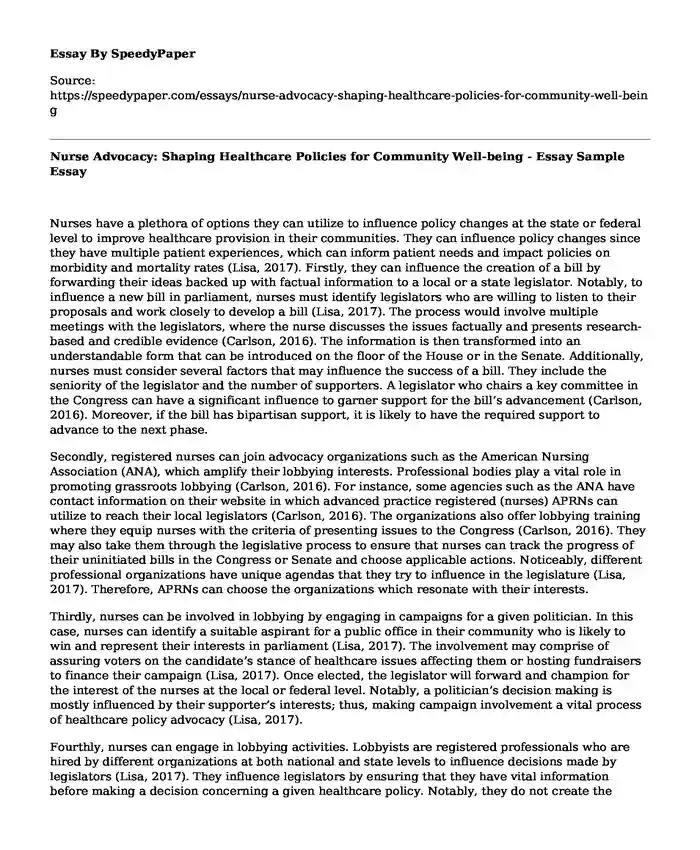
| Type of paper: | Essay |
| Categories: | Policy Nursing Healthcare Healthcare policy |
| Pages: | 3 |
| Wordcount: | 614 words |
Nurses have a plethora of options they can utilize to influence policy changes at the state or federal level to improve healthcare provision in their communities. They can influence policy changes since they have multiple patient experiences, which can inform patient needs and impact policies on morbidity and mortality rates (Lisa, 2017). Firstly, they can influence the creation of a bill by forwarding their ideas backed up with factual information to a local or a state legislator. Notably, to influence a new bill in parliament, nurses must identify legislators who are willing to listen to their proposals and work closely to develop a bill (Lisa, 2017). The process would involve multiple meetings with the legislators, where the nurse discusses the issues factually and presents research-based and credible evidence (Carlson, 2016). The information is then transformed into an understandable form that can be introduced on the floor of the House or in the Senate. Additionally, nurses must consider several factors that may influence the success of a bill. They include the seniority of the legislator and the number of supporters. A legislator who chairs a key committee in the Congress can have a significant influence to garner support for the bill’s advancement (Carlson, 2016). Moreover, if the bill has bipartisan support, it is likely to have the required support to advance to the next phase.
Secondly, registered nurses can join advocacy organizations such as the American Nursing Association (ANA), which amplify their lobbying interests. Professional bodies play a vital role in promoting grassroots lobbying (Carlson, 2016). For instance, some agencies such as the ANA have contact information on their website in which advanced practice registered (nurses) APRNs can utilize to reach their local legislators (Carlson, 2016). The organizations also offer lobbying training where they equip nurses with the criteria of presenting issues to the Congress (Carlson, 2016). They may also take them through the legislative process to ensure that nurses can track the progress of their uninitiated bills in the Congress or Senate and choose applicable actions. Noticeably, different professional organizations have unique agendas that they try to influence in the legislature (Lisa, 2017). Therefore, APRNs can choose the organizations which resonate with their interests.
Thirdly, nurses can be involved in lobbying by engaging in campaigns for a given politician. In this case, nurses can identify a suitable aspirant for a public office in their community who is likely to win and represent their interests in parliament (Lisa, 2017). The involvement may comprise of assuring voters on the candidate’s stance of healthcare issues affecting them or hosting fundraisers to finance their campaign (Lisa, 2017). Once elected, the legislator will forward and champion for the interest of the nurses at the local or federal level. Notably, a politician’s decision making is mostly influenced by their supporter’s interests; thus, making campaign involvement a vital process of healthcare policy advocacy (Lisa, 2017).
Fourthly, nurses can engage in lobbying activities. Lobbyists are registered professionals who are hired by different organizations at both national and state levels to influence decisions made by legislators (Lisa, 2017). They influence legislators by ensuring that they have vital information before making a decision concerning a given healthcare policy. Notably, they do not create the information; instead, nurses forward the message, and the lobbyists deliver it to the right legislators in the correct form (Lisa, 2017). Other activities available through lobbying include monitoring of ongoing bills, developing legislative agendas, and educating nurses on grassroots lobbying methods.
References
Carlson, K. (2016). ENA advocacy and activism. Journal of Emergency Nursing, 42(5), pp. 371-372. DOI:https://doi.org/10.1016/j.jen.2016.07.008
Lisa, L. (2017). Be a legislative advocate. Nursing made Incredibly Easy, 15(1), pp. 1-55. Retrieved from https://journals.lww.com/nursingmadeincrediblyeasy/fulltext/2017/01000/be_a_legislative_advocate.13.aspx
Cite this page
Nurse Advocacy: Shaping Healthcare Policies for Community Well-being - Essay Sample. (2023, Dec 26). Retrieved from https://speedypaper.net/essays/nurse-advocacy-shaping-healthcare-policies-for-community-well-being
Request Removal
If you are the original author of this essay and no longer wish to have it published on the SpeedyPaper website, please click below to request its removal:
- Search Paper Sample: Information Technology in Healthcare
- Free Essay Sample - Apgar Scoring
- Free Essay Example: Self-Care in Social Work
- Culture and Cultural Competency - Essay Example
- Essay Example - Physical and Cognitive Development in Middle Adulthood
- Mental Health Certificate - Free Paper Example
- Essay Example on How the COVID-19 Lockdown Changed My Life
Popular categories




